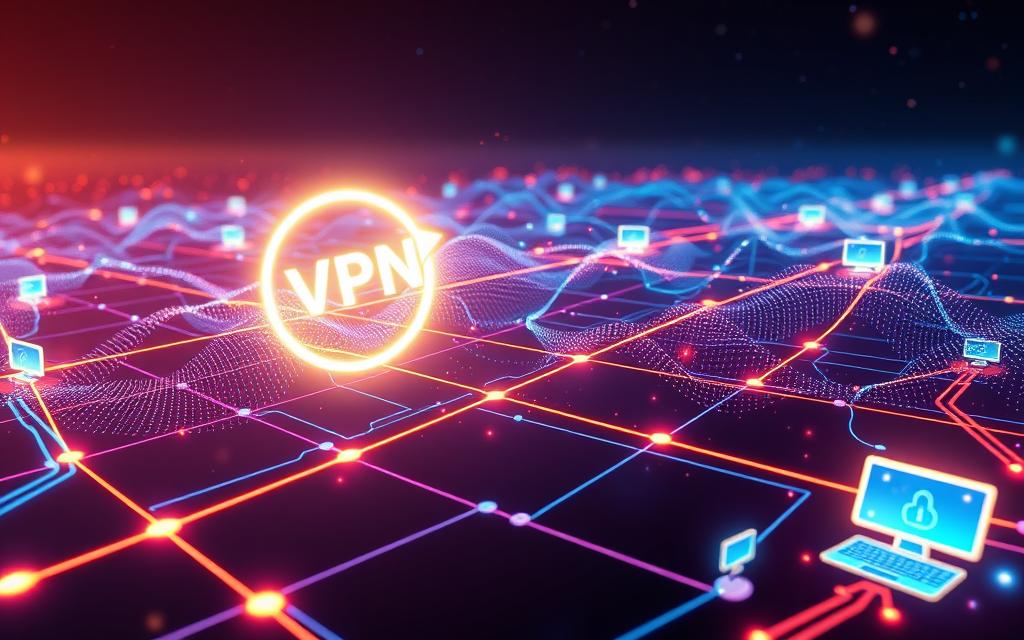How to Speed Up a Slow VPN Connection: Simple Solutions
Learn how to speed up a slow VPN connection with easy tips to boost performance, improve browsing, and ensure a faster, secure online experience.
Ever wondered why your VPN is slow, even though it’s supposed to be fast? VPNs are key for secure browsing, but slow speeds can be a big problem. We’ll look into ways to make your VPN faster.
Whether you’re working from home, watching videos, or just want to browse safely, a fast VPN is crucial. We’ll share tips to boost your VPN’s speed and make your online experience better.
Introduction to VPN Speed Issues
Understanding VPN speed issues is key to better performance and security. A VPN encrypts our internet and routes it through a secure server. This encryption, though safe, can slow down our internet.
Many factors cause VPN speed problems. These include encryption levels, server location, and bandwidth limits. Knowing these helps us fix slow VPNs, keeping our online activities safe and fast.

Balancing VPN security with fast internet is a big challenge. Encrypting data adds to network traffic, causing delays or lag. Also, the distance to the VPN server can slow things down, as data travels further.
As we explore slow VPN connections and fixes, we’ll learn how to improve our online experience. This basic knowledge is essential for finding ways to make our VPNs faster and more secure.
Common Causes of a Slow VPN Connection
Knowing why your VPN might be slow is key to better performance. We’ll look at main reasons like bandwidth limits, server overload, and distance.
Bandwidth Limitations
Internet Service Providers (ISPs) can slow down your VPN. They limit how much data can flow through your network. Data caps imposed by ISPs can cut down your VPN’s speed, making it slower.
This throttling is a big problem during busy times.
Server Overload
The number of users on a VPN server affects speed. Too many users can make a server slow. This is because it can’t handle all the traffic well.
Geographical Distance
How far you are from the VPN server matters a lot. The longer the data travels, the slower it gets. Picking a server near you can make your VPN faster.

Choosing the Right VPN Server
Choosing the right server is key to fast VPN speeds. The server’s location is a major factor. Servers near you are usually faster because they have less latency. This is great for streaming or gaming online.

Another important thing is the server’s load. Busy servers slow down for everyone. So, picking servers with fewer users is better.
Some VPNs have tools to help pick the best server. But, choosing a server near you usually works best. Here are some key points to remember:
- Proximity: Closer servers are faster because of less latency.
- Server Load: Pick servers with fewer users to avoid slow speeds.
- Provider Features: Use your VPN provider’s tools to find the best server.
In short, knowing how to pick a VPN server can make a big difference. By choosing wisely based on location and load, you can improve your internet experience.
Optimizing VPN Protocol Settings
Choosing the right VPN protocol is key to finding a good mix of speed and security. Let’s explore the different VPN protocols. This will help you pick the best one for you.

Differentiating Between Protocols
Each VPN protocol has its own speed and security level. Knowing these differences helps us choose the right one for our needs. Here’s a look at some popular VPN protocols:
| Protocol | Speed | Security |
|---|---|---|
| PPTP | High | Low |
| L2TP/IPSec | Moderate | High |
| OpenVPN | Moderate | Very High |
| SSTP | Moderate | High |
| IKEv2 | High | High |
Recommended Protocols for Speed
If speed is your top priority, look at protocols known for their fast connections. PPTP is the fastest but isn’t very secure. IKEv2 is a good choice because it offers a balance of speed and security.
In summary, picking the right VPN protocol and settings greatly improves your VPN experience. It ensures you get the best performance for your needs.
Updating VPN Software and Network Drivers
It’s key to keep your VPN software and network drivers updated. This ensures your VPN works well and keeps you safe. Updates bring new features and fix security holes. Also, updating your network drivers can make your VPN faster and more reliable.
Why Software Updates Matter
Updating your VPN software is important. It adds new features and fixes bugs and security issues. This means you’re less likely to face slow speeds or security problems. Updates also improve how fast and efficient your VPN is.
Updating Your Network Drivers
Network drivers are crucial for a good internet experience. Old drivers can lead to slow VPN connections. It’s important to keep them updated for fast and smooth connections. This way, your drivers can handle new VPN updates and protocols well.
| Aspect | Benefit of Updates |
|---|---|
| Security | Mitigates Risks and Vulnerabilities |
| Performance | Enhances Speed and Stability |
| Compatibility | Ensures Smooth Operation with Latest Tech |
Regular updates to your VPN software and network drivers are a must. They ensure your VPN is secure, fast, and works well with new tech. This makes for a better VPN experience.
Reducing Bandwidth and Latency Issues
To have a smooth VPN experience, we need to fix bandwidth issues and lower latency. We can do this by managing our network well and optimizing our devices. This way, we make sure VPN traffic gets the priority it needs for better performance.
- Close unnecessary background applications: Many apps and processes run in the background and use a lot of bandwidth. Closing them can greatly improve your VPN speed.
- Optimize device settings: Change your device’s settings to make VPN traffic a priority. This means setting VPN apps and services to run faster.
- Utilize Quality of Service (QoS) features: If your router has QoS, use it to make VPN traffic the top priority. This helps lower latency.
- Monitor network usage: Keep an eye on how much data your network uses. This helps you find and manage apps that use too much bandwidth, so your VPN can run smoother.
By following these steps, we can make our VPN connection faster and more reliable. Here’s a quick look at how these actions can improve your VPN experience:
| Action | Impact on Bandwidth | Impact on Latency |
|---|---|---|
| Closing Apps | Reduces up to 50% | Lowers significantly |
| Optimizing Settings | Increases efficiency | Decreases minor delays |
| Using QoS | Allocates bandwidth effectively | Minimizes lag |
| Monitoring Usage | Keeps bandwidth in check | Ensures steady performance |
Configuring Your Router for VPN Use
Setting up your router for VPN use is key to better speeds and reliability. We’ll show you how to configure your VPN router. This includes Quality of Service (QoS) settings and adjusting the Maximum Transmission Unit (MTU) for better performance.
Setting Up Quality of Service (QoS)
QoS settings are vital for making sure VPN traffic gets priority. This means your VPN will run faster and more smoothly. Here’s how to do it:
- First, go to your router’s web interface. Just type your router’s IP address in your browser.
- Then, log in with your admin details.
- Look for the QoS settings. It’s usually under “Advanced” in your router’s settings.
- Turn on QoS and set rules to favor VPN traffic. You might need to enter specific port numbers or your VPN server’s IP address.
- Save your changes and restart your router.
Adjusting MTU Settings
Optimizing MTU settings is important for better data transmission. Changing the MTU size can reduce packet fragmentation and lower latency. Here’s how to optimize MTU:
- First, check your current MTU setting. You can find this in your router’s web interface under network settings.
- Do a ping test to find the best MTU size. Open a command prompt and type:
ping www.google.com -f -l [MTU size]. Keep adjusting the MTU until you find the largest size without fragmentation. - Enter the new MTU size into your router’s MTU settings field.
- Save and apply the changes, then restart your router.
| Setting | Instructions |
|---|---|
| QoS Configuration | Navigating to QoS settings, enabling it, and prioritizing VPN traffic. |
| MTU Optimization | Adjusting MTU size for efficient data transmission. |
By following these steps, you can make your VPN router work better. This ensures your VPN connection is both fast and reliable.
Practical Tips for Speeding Up Your VPN
To get the best out of your VPN, let’s look at some useful tips. These VPN speed tips will help you accelerate VPN connection. They also tackle common problems that slow you down.
Try using a wired Ethernet connection instead of Wi-Fi. This can cut down on latency and make your connection more stable. It’s a quick fix for VPN speed issues.
2. Temporarily Disable Local Security Software
Antivirus programs or firewalls might slow down your VPN. Turning them off temporarily can help figure out if they’re the problem.
3. Close Unnecessary Applications
Make sure no big apps are running in the background. This frees up your network and boosts VPN speed. It’s key for streaming or big file transfers.
4. Reconfigure DNS Settings
Changing your DNS settings to Google DNS or OpenDNS can speed up your VPN. It makes browsing faster and smoother.
5. Clear Browser and App Caches
Clearing browser and app caches regularly can speed up your internet. It helps your VPN work better too. It’s a simple way to fix VPN slowdowns.
- Keep your VPN software and network drivers updated.
- Choosing the closest server can make a big difference in speed.
- Try different VPN protocols to find the fastest one.
These tips are a quick guide to fix and improve your VPN. Use them to get a faster and better VPN experience.
Conclusion
Understanding why your VPN is slow is key. Bandwidth limits, server overload, and distance to the server all matter. Choosing the right VPN server and tweaking settings are crucial steps.
Keeping your VPN and network drivers up to date is also vital. Updates bring new features and fix problems that slow you down. Setting up your router with Quality of Service (QoS) and adjusting MTU settings can also help.
Using the tips we’ve shared can make a big difference. You don’t have to choose between security and speed. With these strategies, you can have both. We hope these tips help you enjoy faster browsing and streaming.
Frustrated with a sluggish VPN? Visit privatetunnelvpn.com for expert tips on how to speed up a slow VPN connection and enjoy seamless internet today!




